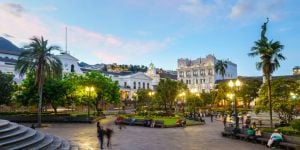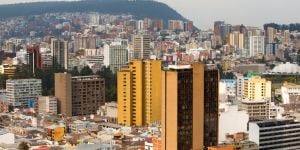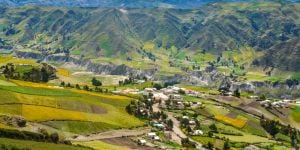español for Gringos
Subscribe to the topic
Post new topic
Overheard at a restaurant....
To the host...
For two people, please.
Para dos personas, por favor.
To the waiter...
Two menus please.
Dos menús, por favor.
To your dinner partner...
What would you like to eat?
Qué quieres comer?
To the waiter...
How is the fish?
Cómo esta el pescado?
What does it come with?
Qué acompaña ello?
Plus two cups of coffee.
Más dos copas de café.
Dessert? Mixed fruits would suit me fine.
Postre? Frutas mixtas me convendrían.
For the tip, I usually leave 15 percent.
Para la propina, generalmente dejo quince por ciento.
What's the difference!
What's the difference between siesta, fiesta y testa?
siesta is a nap.
fiesta is a party.
testa means head. Another word, cabeza, is
frequently used for 'head'.
testar is a verb meaning to 'vouch' or 'attest'.
Mi tío quiere testar ahora que está en plenas facultades.
My uncle wants to attest now that he is of sound mind.
No buses.
The above phrase on a street sign near Calle Garcia Moreno in Quito reads the same in either English or Spanish -- though the pronunciation is different.
Usually, words have at least a slight difference between the two languages.
Here are four examples of slight changes in spelling, with the English word on the left and its equivalent word in Spanish on the right...
vegetables vegetales (veh-heh-TAH-less)
responsible responsable
initial inicial
tuna atún
What's the difference?
What's the difference between la mano, el maní y el mando?
mano = hand (anatomy) .. and can also mean ability or talent.
el maní is a peanut or multiple peanuts.
mando is authority / power / leadership.
In business, it also can mean manager or board
as in board of directors.
In government and the military, it can mean 'officer'
or (an) 'official'.
Why 'el' precedes some feminine nouns starting with 'a'.
Long-ago high school students may remember being taught
that masculine words in Spanish are preceded by el, the
article 'the' in English .. and feminine words are preceded by la.
However, that's not necessarily true when the Spanish noun starts
with the vowel 'a' and the first syllable of the noun is stressed.
The word for 'water' is feminine: agua. 'The water' is el agua.
Also... el área.
And... el ala (the wing).
The key is to avoid stressing back-to-back syllables for
'a' nouns, es decir nouns that start with a stressed syllable.
But note that the rule changes when the 'a' noun is plural .. for reasons
only Osage Archer may be able to explain. Las aguas... las alas.
cccmedia
cccmedia wrote:
But note that the rule changes when the 'a' noun is plural .. for reasons
only Osage Archer may be able to explain. [b]Las aguas... las alas.
cccmedia
Also don't forget the other way around. Sometimes you just have to memorize the exceptions instead of trying to explain them.
For instance, la mano, and mano dura.
But back to el agua and las aguas. The reason for that, is that agua is feminine, but la agua just doesn't sound right because of the two "a" sounds in a row. But plural, las aguas is correct with the feminine las, since it has the "s" separating the two "a"s. I always remember the usage by a phrase like "agua prieta", where in México, anyway, prieta means "dark". Prieta/o as an adjective can also mean "tight" (also see apretado/a).
And there are exceptions to the exceptions...for instance, it's NOT la agua but el agua...but it IS la alcaldía and NOT el alcaldía (the mayoralty).
Yes, it's confusing. But imagine if you had to learn and explain all the exceptions of the English language instead...
Directions for taxista.
While I am arranging for someone to actually show up and start my car in Quito (battery went down during my USA trip), I have been taking taxis .. and giving the taxistas precise directions to navigate the blocks near my apartment on Garcia Moreno in Quito.
Toma la ruta la Vargas y dar la vuelta a la Basílica.
Take Vargas street and make a U-turn at the Basílica.
Tras el gran edificio, doble a la derecha a su próxima oportunidad -- la Carchi.
After the big building, turn right at the next opportunity -- Carchi street.
Doble a la izquierda aquí, entonces siga recto una cuadra y media.
Turn right here, then straight ahead for a block and a half.
A la mitad de esta cuadra, entre los dos señales amarillos, ingrese en la entrada vehicular. La gran puerta es negra.
In the middle of this block, between the two yellow signs, enter through the vehicular entrance. The big door is black.
-- cccmedia
Masking.
In big-city Ecuador, where The Situation has most people wearing medical masks even outdoors, the commonly-used word for such a mask is mascarilla.
The word máscara generally means a full-face mask such as is worn at a costumed event or a robo bancario.
----
Máscara also means the type of eyelash makeup that is known (for instance in the USA) as mascara. Note that the Spanish word clearly has the accent on the first syllable, while the English pronunciation of this cosmetic generally has the accent on the second syllable.
Signage at Banco.
While filling out some deposit slips at Banco Guayaquil near Plaza de la Independencia in Quito today, I noticed the following sign. How much of this could you translate before reading my translation below?
Estimado Cliente
Recuerde realizar sus transacciones
únicamente en nuestras ventanillas.
No acceptes ayuda de terceros
en las filas.
Valued Customer
Remember to do your transactions
only at our (bank) windows.
Do not accept help from third parties
on the lines.
What's the difference!
What's the difference between traducir, trasladar y traicionar?
traducir means to translate, as in translating sentences from English to Spanish.
trasladar means to move or transfer, as in transferring an employee to a new office.
Trasladaron su despacho de Quito a Cumbayá.
They moved their office from Quito to Cumbayá.
traicionar means to betray or to dupe.
What a Gringo thinks.
hogar y ahogar...
hogar is a noun meaning 'home' .. be it a 'casa', a 'departamento' or a yurt.
What a Gringo thinks the word 'ahogar' means...
homeless.
What ahogar really means: it's a verb meaning 'to drown'.
It can also mean: to choke, strangle or asphyxiate.
Your pizza has arrived.
The doorman/guard/vigilante is on the intercom.
Vigilante: Señor, tiene un pedido aquí.
Sir, you have a food order here.
Expat: OK, bajo. Ya me voy.
OK, I come down. Coming now.
---
Pizza delivery agent: Veinticinco dólares, Señor.
25 dollars, Sir.
Expat: Tiene cambio para cuarenta?
Do you have change for 40?
Pizza delivery: Claro.
Sure.
Expat: Gracias por traer my cena. Está la gaseosa?
Thanks for bringing my dinner. Is the soda there?
Pizza delivery: Sí, Señor. Está dentro del paquete.
Buen provecho.
Yes, Sir. It's inside the package. Enjoy your meal.
What's the difference?
What's the difference between mármol, árbol y boli?
mármol means marble (building material).
un árbol is a tree. A word for 'bush' is arbusto.
boli is short for bolígrafo -- a ballpoint pen.
In some countries, the term esfero is more popular
than bolígrafo.
According to wordreference.com, the Spanish word pluma
can mean pen, fountain pen, ballpoint pen or quill (the
antiquated writing instrument).
What a Gringo thinks.
Today's words are taxo y taxista.
What a Gringo thinks they mean: taxo means a tax, taxista mean accountant.
What these two words really mean in español...
taxo is a sour fruit* known as 'the banana passion fruit'.
taxista means taxi driver (male or female).
A word for taxes is impuestos.
A word for accountant is contador or contadora.
*As defined in a just-epublished article titled
A short guide to the strange fruits of Ecuador
at www.cuencahighlife.com
What's the difference!
What's the difference between causar, coser y costar?
.
.
.
.
causar is a verb meaning to cause.
Quién causó el choque?
Who caused the crash?
coser means 'to sew'.
costar means to 'cost'.
Cuánto cuesta ese perro en la ventana?
How much is that doggie in the window?
What's the difference!
What's the difference between cachorro, cachondo y cucaracha?
Cachorro means puppy.
Cachondo means horny.
Cucaracha means cockroach.
Better ironing.
For ironing clothes, a product called Faultless Niagara Original Finish is available in South America .. an ironing spray starch.
As you receive one or two phrases at a time in español, see if you can translate them into English, then scroll down to see how the product's bi-lingual labeling translates the phrases....
Para un planchado más rápido y más fácil mientras deja una aroma de recién lavado.
Makes ironing faster and easier while imparting a freshly-laundered scent.
Usar en algodón, lana y otros tejidos...
Use on cotton, wool and other washable fabrics...
....pero no en artículos que solo deben lavarse en seco.
...but not on dry-clean-only items.
(Products discussed on this thread are for demonstration or teaching purposes only. The author does not receive any compensation for mentioning any products or services. -- cccmedia)
The many meanings of 'pico'.
Often, a one-word translation of a Spanish word does not do justice to the multifaceted possibilities of the word.
Today's word, for instance, can mean 'a little bit' or it can mean 'a fortune'.
Take the apparently simple word pico.
A common translation is beak, as in a bird's protuberance.
--
Ella llegó a las once y un pico.
This is the 'little bit' translation .. meaning:
She arrived a little past eleven.
The 'fortune' translation...
Un coche de esa clase cuesta un pico.
A car of that class costs a fortune.
Pico even means the lip of a bottle or a glass...
No tome ese vino por el pico de la botella.
Don't drink that wine from the lip of the bottle.
The word can also mean corner...
Me lastimé por la rodilla en el pico de ese mueble.
I hurt my knee on the corner of that piece of furniture.
Another way 'pico' is used.
Quito and other cities use a system of rush-hour driving restrictions whereby motorists whose license plates (or placas) end in a certain number may not legally drive their vehicles on a certain day of the week in certain areas of the city during certain hours.
This has reduced air pollution by close to ten percent in those areas during rush hours, according to at least one study.
Why is this system of driving restrictions called Pico y Placa?
Inquiring minds want to know.
Why "pico y placa"? Pico also means "peak", in both senses like Pico Duarte, at 3098 meters the highest peak in the Dominican Republic; and also as in "horario pico", peak traffic hours, or rush hour.
Horario can be a noun or an adjective, as a masculine noun it means schedule or timetable; as an adjective it can mean time or hourly. So actually then horario pico or pico horario works!
Colombia also has "pico y placa" for its larger cities but I don't know if it has worked well, the traffic in many places is still awful. I guess it would be worse without it...
But my favorite pico is pico de gallo, the wonderful salsa whose origin was México, made from tomatoes, onion, cilantro, garlic, jalapeños to your desired degree of hotness, with lime juice and a bit of salt. I recently had this with the addition of avocado/guacamole, and that is really good too.
What's the difference!
What's the difference between despegar, despejar y despertar?
These are all commonly-used verbs in español.
despegar means to unstick. It is also a term popular with laymen used in discussing matters of aviation and rocketry. In these spheres, it means to take off or blast off.
El avión despegó a las seis de la tarde de Houston y aterrizó en Quito a las once. (OHN-say)
The plane took off at six p.m. in Houston and touched down in Quito at eleven (p.m.)
despejar means to clear or clear up.
Pide al mesero a despejar la mesa antes de traernos el postre.
I asked the waiter to clear off the table before bringing us dessert.
Su decisión a ayudar a la madre despejó todas dudas.
His/her/your decision to help the mother cleared away all doubts.
despertar means to wake up (somebody, or an animal).
despertarse means to wake up oneself.
Me despierto a las siete de la mañana entre el lunes y el viernes.
I wake up at seven in the morning between Monday and Friday.
Beat the frizzies.
A hair salon product found in Quito called Keratin Smooth by TRESemmé .. is designed to straighten out frizzy hair and is combed into el cabello for men and women.
The product is labeled in Spanish only .. and we provide this thread with our own translation of the how-to section. Read in español for a phrase or two .. see if you can follow .. and then scroll down to the translations...
Aplica la crema para peinar ... sobre el cabello húmedo o seco,
Apply the cream for combing ... on damp or dry hair,
distribuyendo a lo largo de las mechas.
spreading it out along untidy locks.
No enjuague.
Do not rinse.
Peina y modela como de costumbre. Aplica cuando desees.
Comb and shape as accustomed. Apply whenever desired.
Utiliza la linea completa [productos de TRESemmé] para potenciar los resultados.
Use the complete TRESemmé line of products to produce the best results.
What's the difference!
What's the difference between casado, cansado y casero?
casado means married.
cansado means tired or worn out..
casero The adjective means home-made. The noun means landlord.
---
The above words in español all have feminine versions.
Just replace the final 'o' with an 'a'.
Juana es una cansada casada.
Juana is a tired married woman.
casar = to marry
cazar = to hunt, shoot or catch
Ipso facto...
casado = married
cazado = hunted, shot or caught
Words and phrases an Expat may have learned during The Situation.
English first, then español....
the pandemic
la pandemia
mask (for lower face)
mascarilla mahs-kah-REE-yah
curfew
toque de queda
vaccinated
vacunado/a
wash your hands
lave (LAH-bay) las manos
must cover nose and mouth
debe cubrir nariz y boca
persons who are ill may not enter
ingreso de personas enfermas no permitido
Do you offer home delivery for food orders?
Ofrecen entrega de pedidos a domicilio?
Casado married
cazado hunted
saludos
Starts with a-g-u.
agua water
aguja needle
agujeta stiffness
agujero hole
aguardiente hard-liquor beverage considered
the national drink of Colombia
Ice cream talk.
La Paletería (Spanish for palate or sense of taste) brand of ice cream appears in the MegaMaxi freezer section in Quito. One tasty flavor of this helado artesenal is the super-sweet (though only 5g of sugar per serving) dulce de leche. (Fruity flavors such as açaí and strawberry may also be available.)
The tongue-in-cheek labeling is Gringo-friendly and some of it doesn't even need to be translated for the average Expat to understand it.
Recomendaciones de uso.
Perfecto para un Netflix & Chill.
Apto para cualquier día de la semana.
Suitable for any day of the week.
Necesario para emergencia
de corazón roto. (broken heart)
Nuestros botes contienen
Our packages contain
-- Frutas totalmente frescas y naturales
-- Magia de manos trabajadoras
Magic of hard-working hands...
Puede contener trozos de arcoíris.
May contain pieces of a rainbow.
What's the difference!
What's the difference between amazona, armazón y el Amazonas?
amazona is a woman from the South American rainforests. The word can also mean 'riding suit' or 'horsewoman'; a common word for horsewoman (or horseman) is jinete (hee-NET-ay).
armazón means 'frame' as in eyeglass frames, the frame of a boat or a building's frame.
el Amazonas = the largest river in South America.
--- Amazonia is the name of the South American river basin that is the largest in the world. (Wikipedia)
What's the difference!
What's the difference between cinco, quince, cincuenta, quinientos y mil quinientos?
cinco = five
quince = fifteen ... pronounced KEEN-say
cincuenta = fifty
quinientos = 500
mil quinientos = 1,500
What´s the difference?
What´s the difference between dos, doce, doscientos, dos mil y dos mil doscientos veinte?
dos = two
doce = twelve (DOH-say)
doscientos = 200
dos mil = 2,000
dos mil dos cientos veinte = 2,220
---
The word for 20 is veinte. (BAIN-tay)
Ten things you can do with liquids.
pour verter, servir
drink beber, tomar
spray rociar
rinse enjuagar
spit escupir
taste probar
swallow tragar
drain escurrir
mop fregar
launder lavar
Our colleague Osage Archer adds echar (ay-CHAR) to our list -- to throw or to toss.
He also submits derramar, to spill.
--
Echar is part of a common idiom, as well: echar un vistazo, which culturally means 'to glance' or 'have a look'.
Carlos echó un vistazo a la hermosa viuda.
Carlos glanced at the beautiful widow.
Ten things you can do with a ball.
hit golpear
kick patar
throw tirar
roll hacer rodar
run correr
pass pasar
putt golpear en corto
leap saltar
bounce botar
rebound rebotar
What's the difference!
What's the difference between venga!, venganza y vanguardismo?
venga! = come on!, let's go!
venganza = vengeance
vanguardismo = the avant garde movement (the arts)
cccmedia wrote:Ten things you can do with liquids.
Our colleague Osage Archer adds echar (ay-CHAR) to our list -- to throw or to toss.
Also, echar can mean to pour, or pour out, as well as emit:
A mí échame un poco más, porfa. For me, pour me out a bit more, pleez.
Si su carro echa humo, pueden cobrarle una multa. If your car emits/pours out/belches smoke, they can fine you.
¿Por qué podemos echar líquido de un recipiente a otro tan fácilmente? • Porque sus partículas están tan fuertemente unidas como en un sólido Why can we pour liquid from one container to another so easily? Because its particles are so strongly united with one another as in a solid.
Echar a la calle to throw out (on the street)
Al final, sus padres lo echaron a la calle, y no le quedó más remedio que buscarse un trabajo.
Eventually, his parents threw him out on the street, and he had no choice but to find a job.
Articles to help you in your expat project in Ecuador
 Spanish Can Be Easy
Spanish Can Be EasyForeign languages have always caused me a bit of anxiety... Heck, my english is a little suspect sometimes. I ...
 Study in Ecuador
Study in EcuadorNeed to learn Spanish? Want to attend a high school, a university, or trade school in the Andes? Come to Ecuador ...
 Food in Ecuador
Food in EcuadorWhat kind of food will you find in restaurants, cafes, and private homes in Ecuador? Many restaurants in Ecuador ...
 Work in Ecuador
Work in EcuadorEcuador is famous as a retirement haven. But you might not want to wait until retirement age to move there and ...
 Healthcare in Ecuador
Healthcare in EcuadorEcuador, as a fast-developing nation, has laws that are constantly evolving, but one thing is certain: the ongoing ...
 Opening a bank account in Ecuador
Opening a bank account in EcuadorA few years back, an expat would just breeze into an Ecuadorian bank, flash their passport and a bank account ...
 Family and children in Ecuador
Family and children in EcuadorFamily is everything to an Ecuadorian. The extended family unit is the most important aspect of life in Ecuador, ...
 The Working Holiday Visa for Ecuador
The Working Holiday Visa for EcuadorEcuador is truly a paradise for adventure and nature lovers, and thanks to the Working Holiday Visa program, they ...
Find more topics on the Ecuador forum



